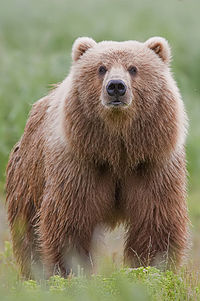Beir
The "Scots" that wis uised in this airticle wis written bi a body that haesna a guid grip on the leid. Please mak this airticle mair better gin ye can. (Februar 2021) |
Beirs are carnivoran mammals o the faimily Ursidae. Thay are clessifee'd as caniforms, or duglik carnivorans. Awtho anly aicht speshies o beirs are livin, thay are widespread, bidin in sindry habitats ootthrou the Northren Hemisphere an pairtially in the Soothren Hemisphere. Beirs are foond in North Americae, Sooth Americae, Europe, an Aisie. Common chairactereestics o modren beirs include muckle bouks wi stocky legs, lang snoots, smaw roond lugs, shaggy hair, plantigrade paws wi five nonretractile claws, an short tails.
| Beirs | |
|---|---|

| |
| Broun beir frae Kodiak, Alaska | |
| Scientific classification | |
| Kinrick: | Animalia |
| Phylum: | Chordata |
| Cless: | Mammalia |
| Order: | Carnivora |
| Infraorder: | Arctoidea |
| Faimily: | Ursidae G. Fischer de Waldheim, 1817 |
| Subfaimilies | |
|
†Amphicynodontinae | |
While the polar beir is maistly carnivorous, an the giant panda feeds awmaist entirely on bamboo, the remeenin sax species are omnivorous wi varied diets. Wi the exception o coortin individuals an mithers wi thair young, beirs are teepically solitar ainimals. Thay mey be diurnal or nocturnal an hae an excellent sense o smell. Despite thair hivy big an ackwart gait, thay are adept runners, climmers, an soummers. Beirs uise shelters, sic as caves an logs, as thair dens; maist species occupy thair dens in the winter for a lang period o hibernation, up tae 100 days.
Bears hae been huntit syne prehistoric times for thair meat an fur; thay hae been uised for beir-baitin an ither forms o enterteenment, sic as bein made tae dance. Wi their pouerfu pheesical presence, thay play a prominent role in the airts, meethologie, an ither cultural aspects o various human societies. In modren times, beirs hae come unner pressur throu encroachment on thair habitats an illegal tred in beir pairts, includin the Asie bile bear mervat. The IUCN leets sax beir speshies as vulnerable or endangered, an even least concern species, sic as the broun beir, are at risk o extirpation in certain kintras. The poachin an internaitional tred o thir maist threatened populations are prohibitit, but still ongaein.
| Wikimedia Commons haes media relatit tae Ursidae. |
| This ainimal-relatit airticle is a stub. Ye can help Wikipaedia bi expandin it. |